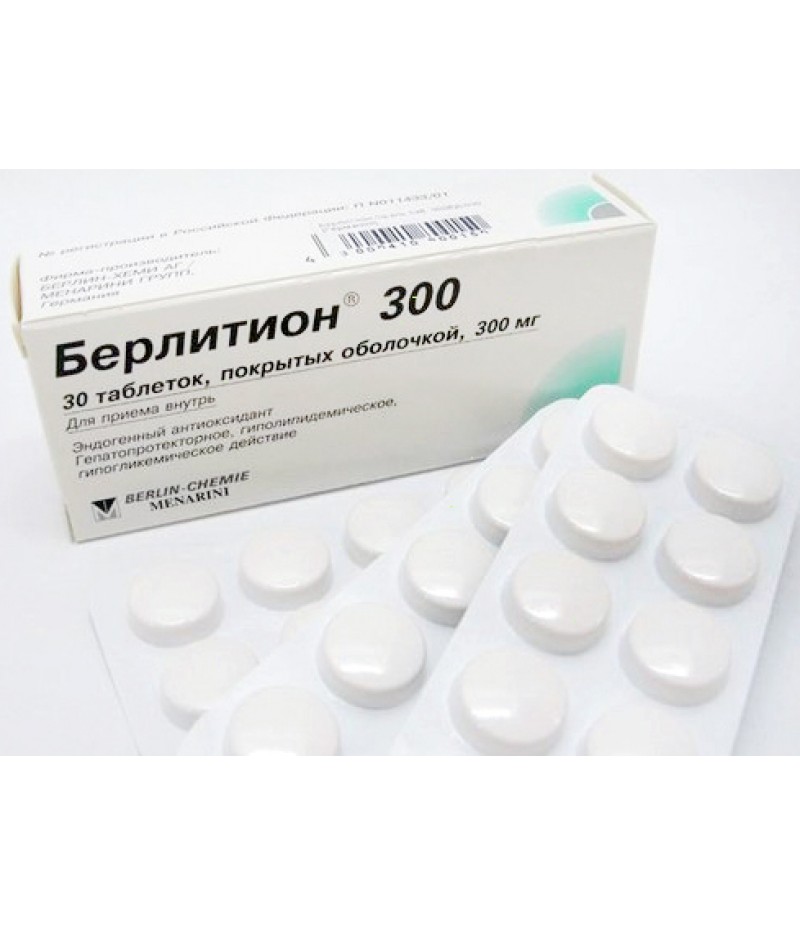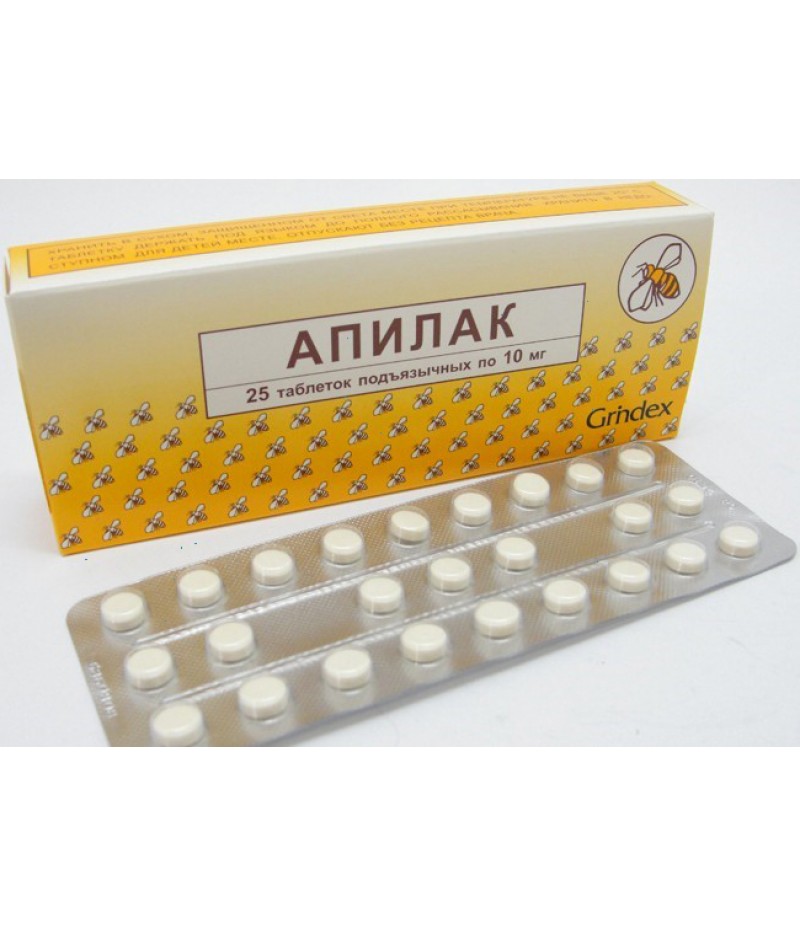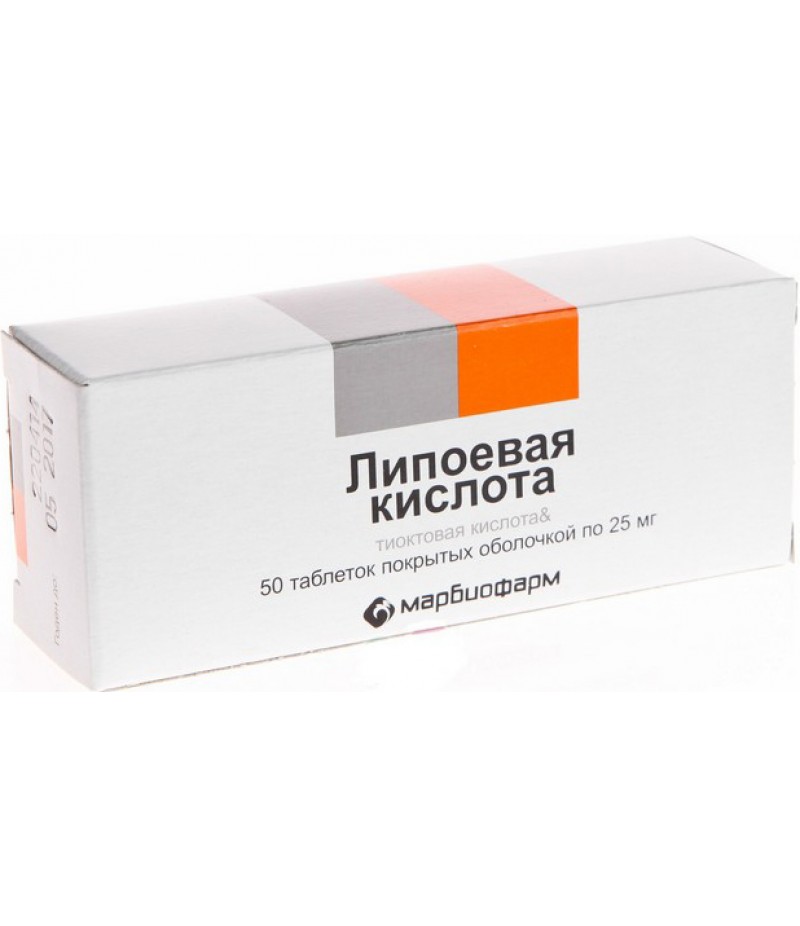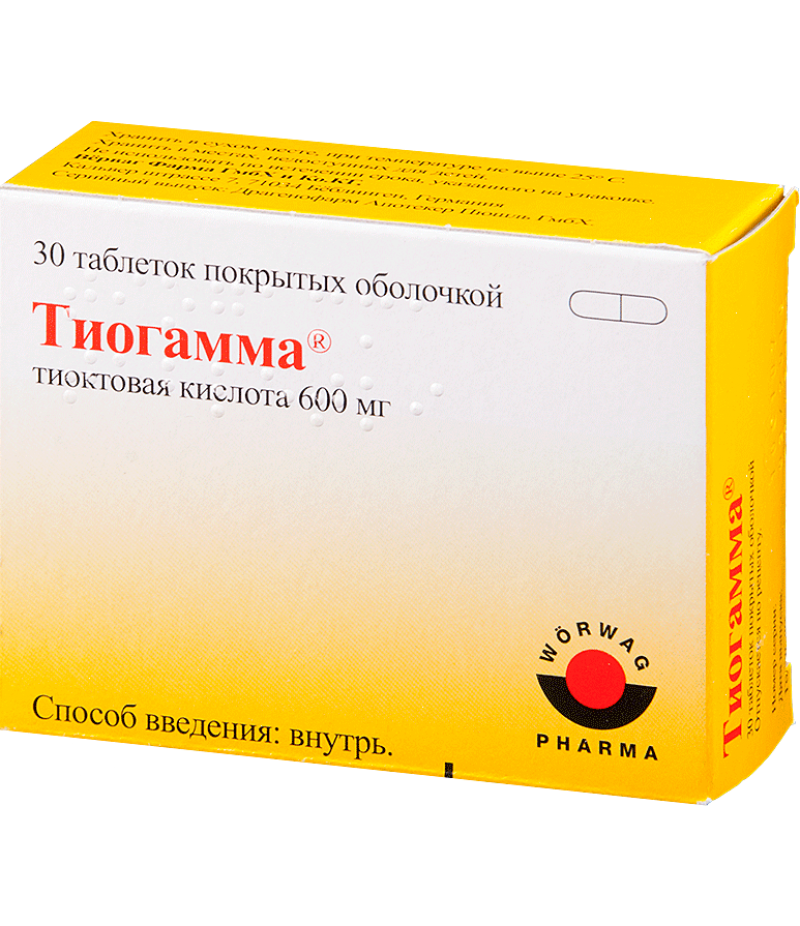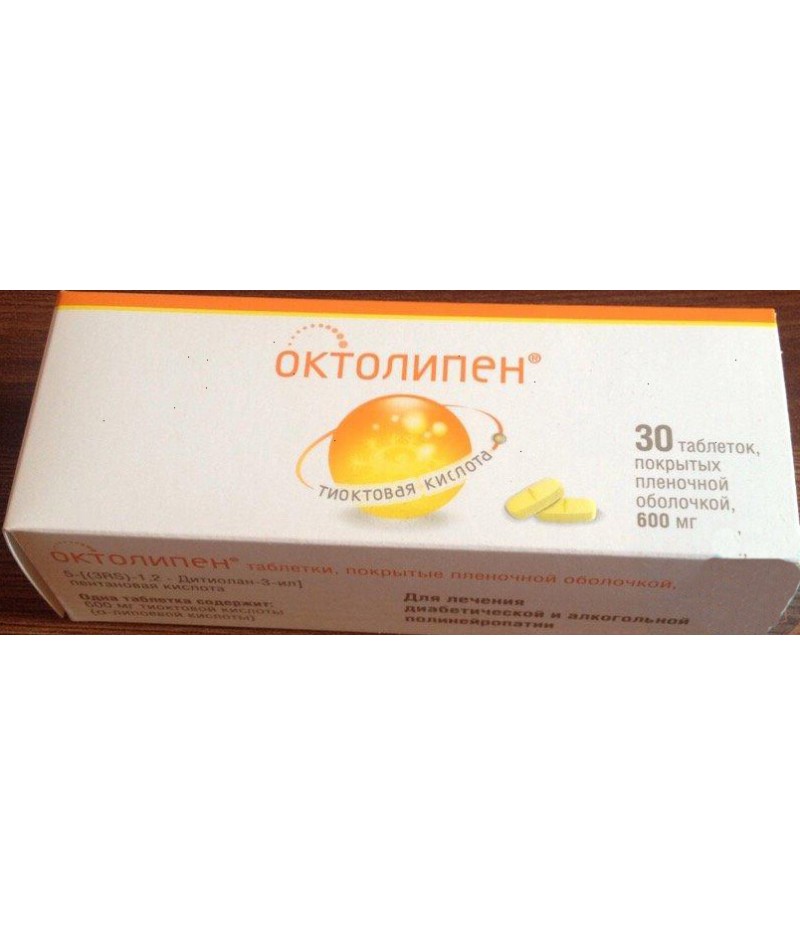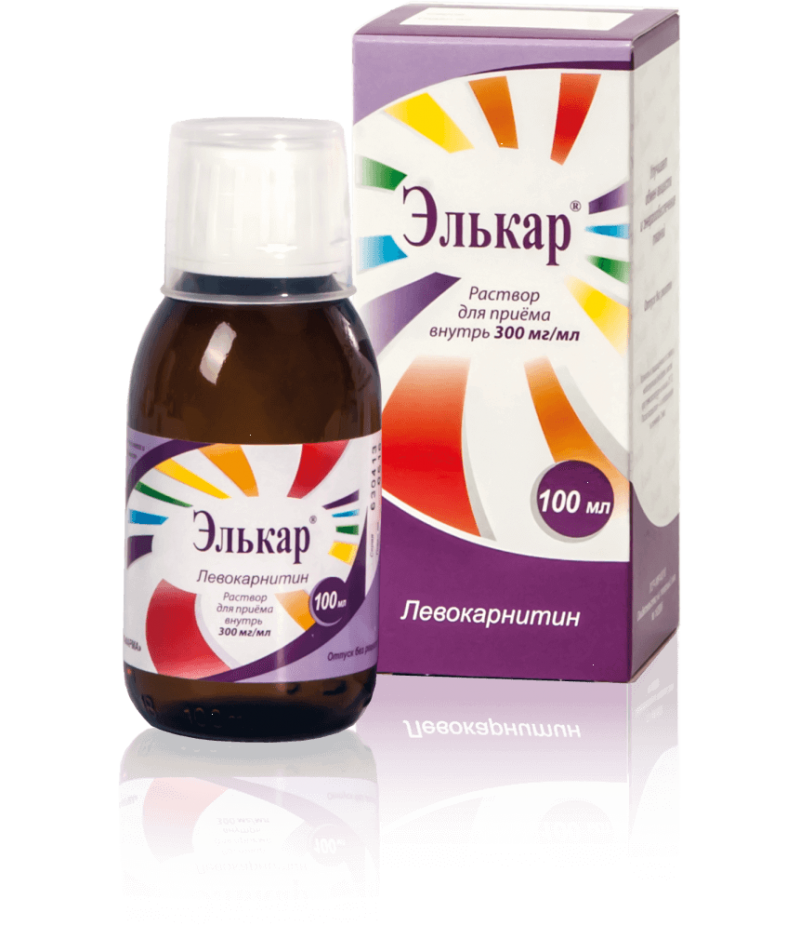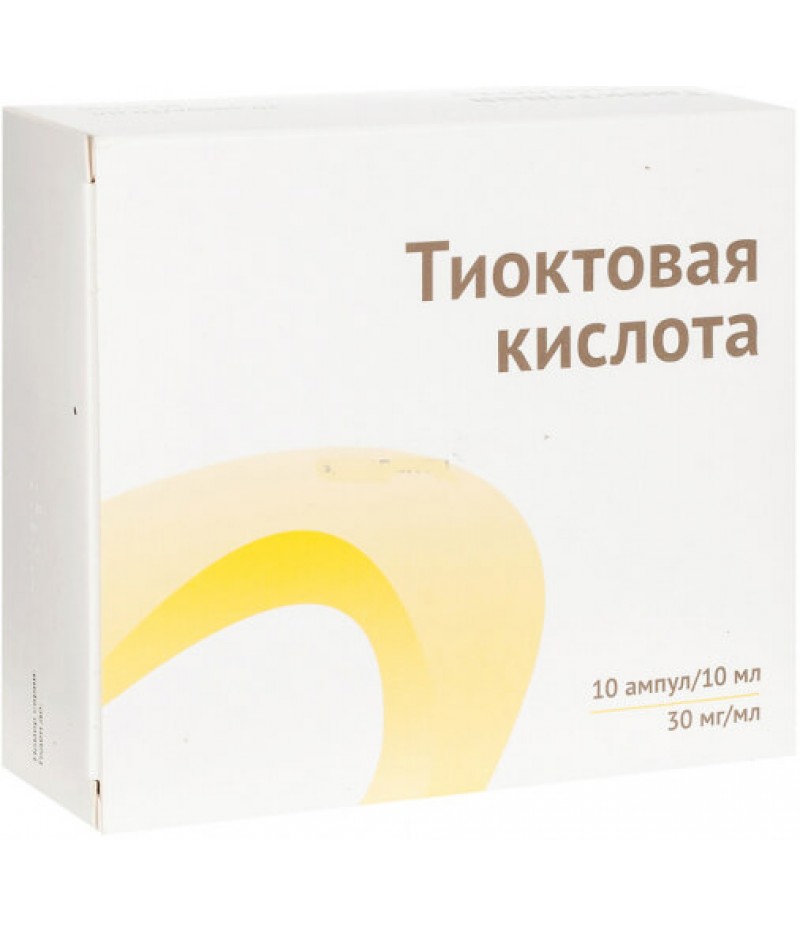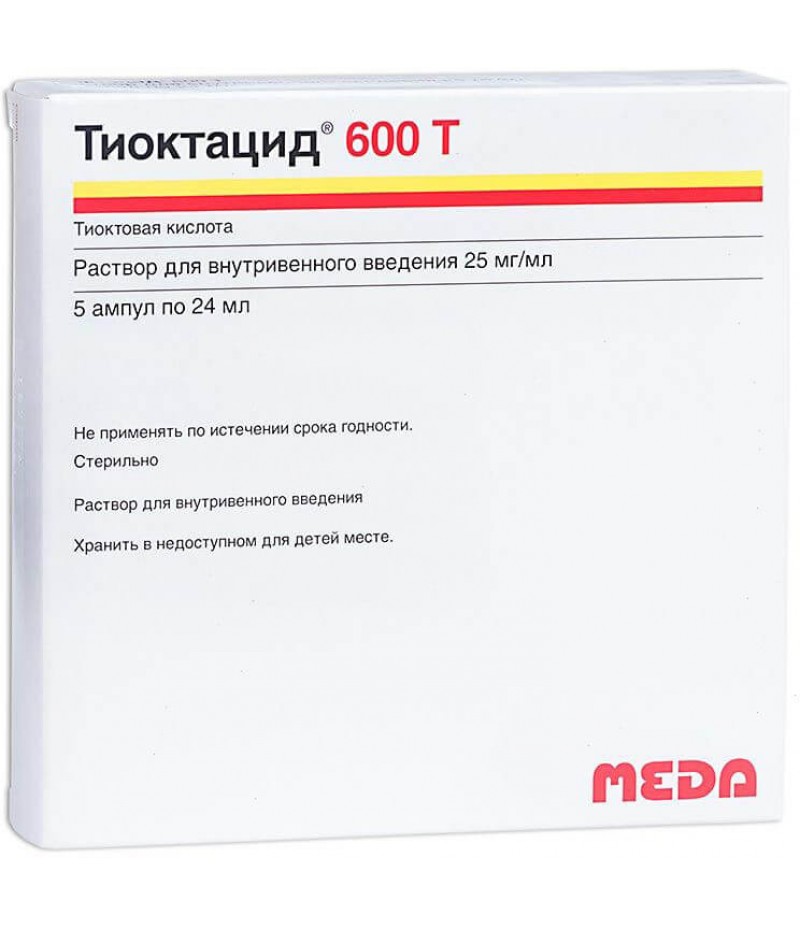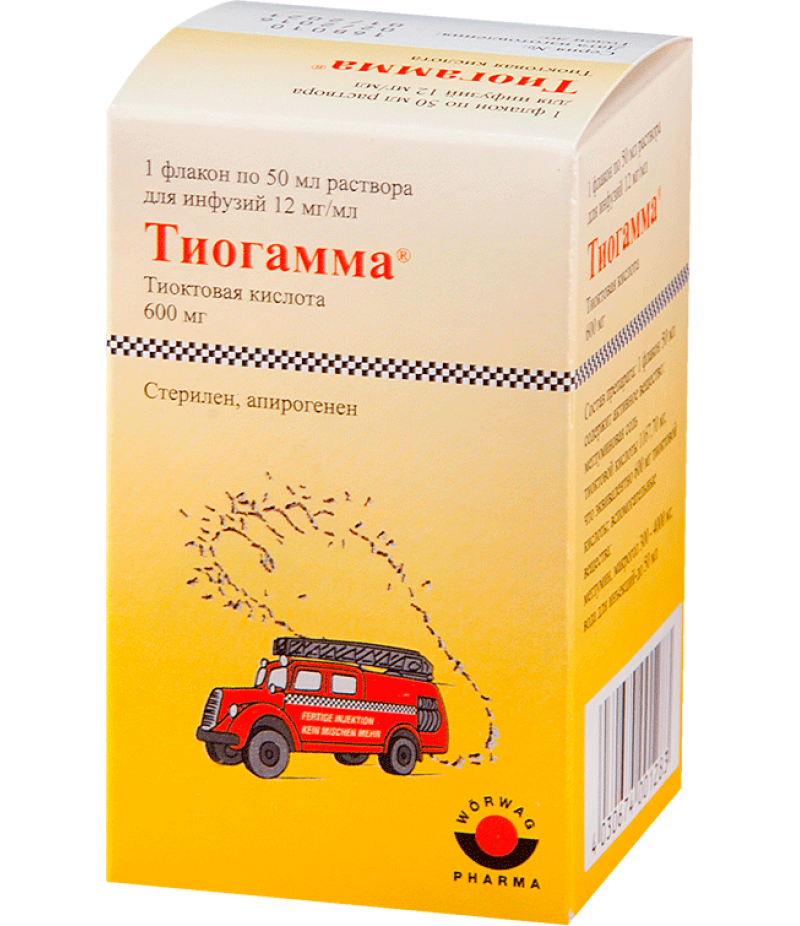Berlithion 300 tabs 300mg #30
- $39.27
- 2 or more $37.80
- 3 or more $34.90
- Availability:In Stock
Berlithion instruction for useReed more about Berlithion and buy it on this pageCompositionOne tablet contains 300 mg of thioctic acid. In addition: magnesium stearate, lactose monohydrate, croscarmellose sodium, MCC, colloidal si..
Tags: tabs
Berlithion instruction for use
Reed more about Berlithion and buy it on this page
Composition
One tablet contains 300 mg of thioctic acid. In addition: magnesium stearate, lactose monohydrate, croscarmellose sodium, MCC, colloidal silicon dioxide, povidone, yellow Opadrai OY-S-22898 (as a shell).
Form of issue
Berlithion medicine is produced in the form of a concentrated (concentrate) infusion solution in ampoules of 12 ml for 300 mg and 24 ml for 600 mg of No. 5 or No. 10; in the form of capsules of 300 mg and 600 mg of No. 15 or No. 30; in the form of tablets of 300 mg No. 30.
pharmachologic effect
Hypocholesterolemic, hepatoprotective, hypolipidemic, hypoglycemic.
Pharmacodynamics and pharmacokinetics
Berlithion includes, as an active ingredient, thiectic acid (alpha-lipoic acid) in the form of an ethylenediamine salt, which is an endogenous antioxidant binding the free radicals to the coenzyme of the decarboxylation of alpha-keto acids.
The treatment with Berlithion helps to reduce the plasma glucose and increase the level of hepatic glycogen, weakens insulin resistance, stimulates cholesterol, regulates lipid and carbohydrate metabolism. Thioctic acid, due to its inherent antioxidant activity, protects the cells of the human body from damage caused by the products of their decay.
In patients with diabetes, thioctic acid reduces the release of protein glycation end products in nerve cells, increases microcirculation and improves endoneural blood flow, increases the physiological concentration of glutathione antioxidant. Due to the ability to reduce the plasma glucose content, it affects the alternative way of its metabolism.
Thioctic acid reduces the accumulation of pathological polyol metabolites, thereby contributing to the reduction of edema of the nervous tissue. Normalizes the conduct of nerve impulses and energy metabolism. Participating in fat metabolism, increases the biosynthesis of phospholipids, as a result of which the damaged structure of cell membranes is reformed. Eliminates the toxic effects of the products of alcohol metabolism (pyruvic acid, acetaldehyde), reduces the excess release of free oxygen radical molecules, reduces ischemia and endoneural hypoxia, softening the symptoms of polyneuropathy, manifested in the form of paresthesias, burning sensations, numbness and pain in the extremities.
Proceeding from the foregoing, thioctic acid is characterized by its hypoglycemic, neurotrophic and antioxidant activity, as well as lipid metabolism-enhancing action. The use of the active ingredient in the form of ethylenediamine salt in the preparation makes it possible to reduce the severity of the possible negative side effects of thioctic acid.
When administered orally, thioctic acid is rapidly and completely absorbed from the digestive tract (in parallel, the intake of food slightly reduces absorption). TCmax in plasma varies within 25-60 minutes (with iv introduction 10-11 minutes). Plasma Cmax is 25-38 μg / ml. Bioavailability approximately 30%; Vd about 450 ml / kg; AUC is about 5 μg / h / ml.
Thioctic acid is susceptible to the effect of "first passage" through the liver. The release of metabolic products is made possible by conjugation and oxidation of the side chain. Excretion in the form of metabolites by 80-90% is carried out by the kidneys. T1 / 2 takes approximately 25 minutes. The total plasma clearance is 10-15 ml / min / kg.
Indications for use of Berlithion
Indication for the use of Berlithion is the treatment of alcoholic and diabetic polyneuropathy.
Contraindications
Berlithion is contraindicated in patients under 18 years of age, patients with personal hypersensitivity to active (thioctic acid) or any of the auxiliary ingredients used in the treatment of drug dosage, as well as to lactating and pregnant women.
Berlithion 300 tablets, in connection with the presence in this dosage form of lactose, are contraindicated in patients with any hereditary intolerance to sugars.
Side effects
For all dosage forms of the drug
violation / change in taste;
decrease in plasma glucose (due to improved digestion);
Symptoms of hypoglycemia, including visual impairment, dizziness, hyperhidrosis, headaches;
allergic manifestations, including skin rash / itching, urticaria rash (urticaria), anaphylactic shock (in isolated cases).
Additionally for parenteral forms of the preparation
diplopia;
burning in the area of injection;
convulsions;
thrombocytopathy;
purpura;
difficulty breathing and increased intracranial pressure (noted in cases of rapid IV injection and passed spontaneously).
Additionally for oral forms of the drug
nausea, vomiting;
diarrhea (diarrhea);
feeling of pain in the abdomen.
Berlithion, instructions for use (Method and dosage)
The official instruction for the use of Berlithion 300 is identical to the instructions for use of Berlithion 600 for all dosage forms of this drug (injection, capsules, tablets).
Drug Berlithion intended for the preparation of infusions is initially prescribed in a daily dosage of 300-600 mg, which is administered intravenously intravenously for a minimum of 30 minutes, for 2-4 weeks. Immediately before the infusion, a solution of the drug is prepared by mixing the contents of 1 ampoule with 300 mg (12 ml) or 600 mg (24 ml) with 250 ml of injectable sodium chloride (0.9%).
In connection with the photosensitivity of the prepared infusion solution, it must be protected from exposure to light by winding it with aluminum foil, for example. In this form, the solution can retain its properties for about 6 hours.
After 2-4 weeks of therapy with the use of infusions, they switch to treatment with the use of oral medicinal forms of the drug. Capsules or tablets Berlithion appointed in a daily maintenance dose of 300-600 mg and taken on an empty stomach entirely about half an hour before a meal, drinking 100-200 ml of water.
The duration of the infusion and oral therapeutic course, as well as the possibility of their re-holding, is determined by the attending physician on an individual basis.
Overdose
Negative symptoms of a moderate overdose of thioctic acid are manifested by nausea and vomiting and headaches.
In severe cases, confusion or psychomotor agitation, generalized convulsions, hypoglycemia (prior to coma formation), severe acid-alkaline disorders with lactic acidosis, acute necrosis of skeletal muscle tissue, multiple organ failure, hemolysis, DIC syndrome, and depression of bone marrow activity may occur.
If you suspect a toxic effect of thioctic acid (for example, if you take more than 80 mg of a medicinal product per kilogram of weight), it is recommended to immediately take the patient's hospitalization and immediately begin to implement common measures to counteract accidental poisoning (cleaning the digestive tract, taking sorbents, etc.). Further, symptomatic therapy is indicated.
Treatment of lactic acidosis, generalized seizures and other potentially life-threatening patient illnesses should occur in the intensive care unit. A specific antidote has not been identified. Hemoperfusion, hemodialysis and other methods of forced filtration are ineffective.
Interaction
For thioctic acid, its interaction with therapeutic agents, including ionic metal complexes (for example, with the platinum drug Cisplatinum) is characteristic. In this regard, the combined use of Berlithion and metal preparations can lead to a decrease in the effectiveness of the latter.
The parallel administration of ethanol-containing drugs leads to a decrease in the therapeutic effect of Berlithion.
Thioctic acid enhances hypoglycemic activity of oral hypoglycemic drugs and insulin, which may require adjusting their dosage regimen.
Berlithion for injection is incompatible with the drug solutions used as the basis for the preparation of infusion mixtures, including Ringer's solution and Dextrose, as well as solutions reacting with disulfide bridges or SH-groups.
Thioctic acid is capable of creating hardly soluble complexes with sugar molecules.
Storage conditions
Ampoules of Berlithion should be stored in the factory carton in a dark place, with a maximum temperature of 25 ° C. Capsules and tablets of the drug require a similar storage temperature.
Shelf life
Injection Berlithion 300 mg and 600 mg can be stored for 3 years; capsules 300 mg - 3 years, capsules 600 mg - 2.5 years; tablets of 300 mg - 2 years.
special instructions
Patients with diabetes who take oral hypoglycemic drugs or insulin against the background of therapy with Berlithin require constant monitoring of plasma glucose content (especially at the beginning of treatment) and, if necessary, adjusting (decreasing) the dosage regimen of hypoglycemic drugs.
When using injectable medicinal forms of Berlithion, hypersensitivity phenomena may occur. In case of appearance of negative symptoms, characterized by itching, malaise, nausea, the introduction of Berlithion should be stopped immediately.
Freshly prepared infusion solution Berlithion should be protected from exposure to light.
When prescribing Berlithion tablets, the doctor should take into account the content of the lactose preparation in this dosage form, which may be important for patients with intolerance to sugars.
Analogues
Analogues of Berlithion , similar to it with their curative effects, are represented by a variety of groups of drugs, in connection with which, the price of the analogues of Berlithion fluctuates within quite a wide range from several tens to several thousand rubles.
The most famous analogs are:
Synonyms
Lipoic Acid;
Alfa-Lipon;
Thioktodar;
Espa-Lipon;
Octolipen;
Dialipone;
Tiogamma;
Lipamid;
Thiolipone;
Liptiokson;
Neurolephone, etc.
Children
Due to the insufficiently studied influence of Berlithion on children's body, its use in pediatrics is contraindicated.
With alcohol
The intake of any alcoholic beverages against the background of the application of Berlithion leads to a decrease in the effectiveness of the therapy.
In pregnancy and lactation
In connection with incomplete data on the safety of the use of pregnant women and nursing women, during these periods, its purpose is contraindicated.
Reviews about Berlithion
The preparation Berlithion 300 and Berlithion 600 in any dosage form (injection, tablet capsules) is often enough and, importantly, it is successfully used for the treatment of patients with diabetes mellitus and liver pathologies.
Reviews of Berlithion at the forums, among the patients treated with its use, as well as the reviews of the doctors prescribing this remedy, are positive in 95% of cases, and they speak not only about the excellent results of the therapy, but also about the practical absence of side effects of such treatment . Naturally, it is only the specialist doctor who can appoint Berlithion, and only if his application is really necessary.

